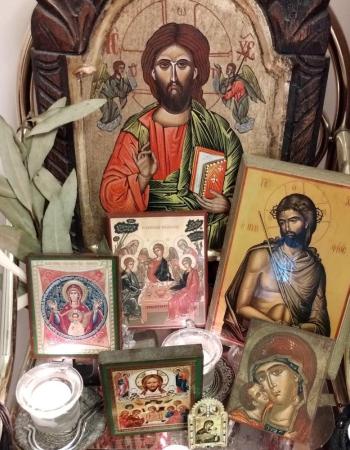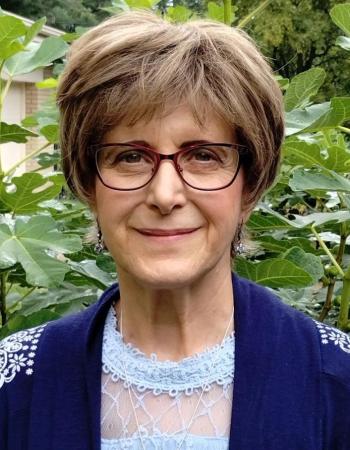
Helen Creticos Theodoropoulos is our Woman of the Week, nominated for her work as a patristics professor at St. Sava Serbian Orthodox School of Theology. You see her here with graduates from Holy Cross Seminary in 2017 and receiving the Order of St. Sava. We asked her to tell you what drew her to study the church fathers and then to teach about them:
“Way back in the day I actually was pre-med. I have an identical twin sister who is a physician and she specializes in infectious diseases. Catherine's quite notable. She's done work for OCAMPR and sat on the Bishops’ AIDS Task Force. But I found myself drawn to the questions that people who are ill ask, existential questions about life and death, and meaning. I thought about doing medical ethics, and a professor of ethics of mine at the University of Chicago, who was Protestant, said, ‘You know, Helen, you can't just do ethics without standing somewhere. What is your own perspective? Why don't you consider going to your own seminary?” So a Protestant professor prompted me to go to Holy Cross for my second master’s, in theological studies.
“I fell in love, not with a person, but with our faith. I had known something about our church, but I wasn't invested in our church, and I didn't attend services faithfully. But I had an awakening to the presence of Christ in my life. That reconnected me to worship, to the faith community, and to internalizing the faith and making it a way of life. I'll always be grateful to Holy Cross. My instructors were some of the most wonderful priests to lead the way. I also discovered and fell in love with the church fathers, which changed my trajectory entirely. One of my professors was Bishop Demetrios Trakatellis, who later became our Archbishop, a dear person and a wonderful teacher, who supported me in my progress.
“I wanted to incorporate the study and teaching of the church fathers in my academic life and went on to earn my PhD at the University of Chicago. They were very welcoming and basically gave me a grant that paid for my entire doctorate. My academic interest lay in combining both Roman Catholic and Orthodox Patristic history and teaching, so that I'd have a broader base for teaching. The first place I taught, though, was as an adjunct at the Episcopal Seminary, Seabury-Western, where I taught for 12 years. I was teaching there even before I received my PhD, teaching about the church fathers from the fourth century, as well as Orthodox spirituality and mystical classics. Several of my women students there later became ordained Episcopal ministers.
“Shortly after I earned my PhD, Metropolitan Christopher (Kovacevich) called and said, ‘I've heard that you have a PhD.’ He wanted to begin to staff the Saint Sava Serbian Seminary with some American-born Orthodox with doctorates in the hope of advancing the school to accreditation, and wanted my course in patristics to be taught in English. I started in 1999 and have taught there every year since. I also teach a course on Christianity in America, and we visit local Christian communities. Once I brought my current Serbian male seminarians to the Episcopal church where one of my former woman students now is the priest. It was rather extraordinary, and went very well. I also taught undergraduates at Loyola University Chicago for twelve years: Orthodox Christian studies, contemporary issues in Orthodoxy, and women’s spirituality. I had an interesting mix of Orthodox, Catholic, and Muslim students. After my time at Loyola, I began to teach as an adjunct at the University of Saint Mary of the Lake Seminary in Mundelein, teaching doctoral and master’s students in Eastern Christian patristics and spirituality.
“It's a great joy to work with young people who are questioning, seeking, and still in the process of being formed. It's enlightening to see how the seminarians go from being young men–kids, really–to becoming shepherds for the faithful. I have seen many of them transform in wonderful ways to become good priests and guides for the church. That's the rewarding part.
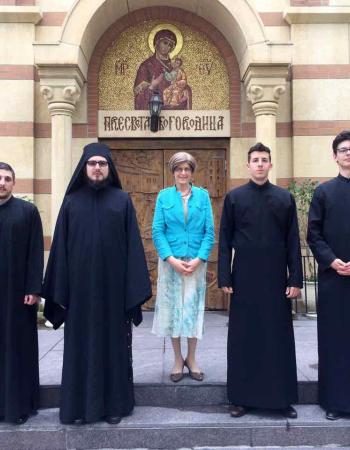
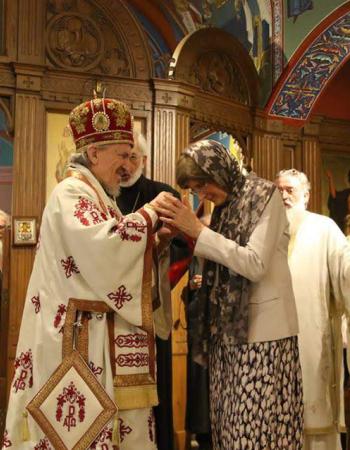
“I've also been teaching the weekly Bible study at my church, as well as one twice a month at a second church in the area, and an adult education program every other Sunday. The Bible studies have been an incredible gift. They have been the most important part of my own education as an Orthodox Christian. Reading the scriptures and seeking to go deeper into them has brought my faith alive in ways I never anticipated. They are an inexhaustible and wondrous treasure. We need to encourage and emphasize the reading of scripture as a deep dive. It's something that priests and hierarchs, as well as laypeople and all Christians, need to continually do to renew their faith and their understanding. I've learned more from my students and their questions and my journey in this than I learned in any PhD program.”
In 2018 I was honored to receive The Order of St. Sava, bestowed by the Patriarchate of Serbia for meritorious service (the highest recognition given by the Church to a layperson) for my work at the Seminary. I was stunned—astounded—but the experience that humbled me to my very bones was when the Bishop called me to the Solea at the end of the Liturgy, placed the award over my head, and then initiated the singing of Axia, together with all in the Church (including some of my students). I never in my life thought I would hear "Axia" sung for me and could hardly believe it was real. I was so overwhelmed, so humbled, that all I could think was to disappear—to prostrate myself in my heart—beneath the awesome weight of those words. To this day, reflecting on the experience takes my breath away and serves as a call to recommit to the service of the Lord.
Axia!
Our Woman of the Week is Helen Creticos Theodoropoulos, nominated for her work as a patristics professor at St. Sava Serbian Orthodox School of Theology. You see her here with Metropolian Kallistos (Ware) and with Holy Cross Seminary graduates at the International Orthodox Theological Association in Volos, Greece, in January 2023. We asked her to tell you what she would like you to know about the church fathers, and which women among the patristic writers she would recommend:
“I want people to begin to see them as our friends, our companions, and our mentors, people who care about us and offer insights that help us to grow in our faith. I have very little patience for a purely scholarly or academic approach to the church fathers. Of course, it matters on one level what the argument is and the different texts that are used, and the historical context. All of those things are important in some way and inform the reading of the text. But we need to hear what they're trying to tell us about who God is, why He cares about us, and how He saves us. I hope to help people gain the facility to enter into the text in a way that leads to a conversation, insight and spiritual growth.
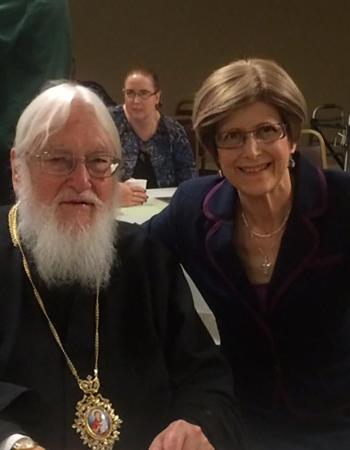
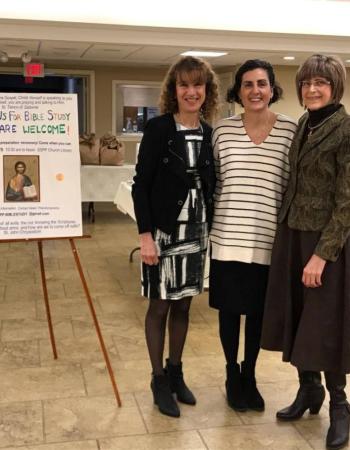
“But in order to do that, you have to get through the format, the language, and the historical distance that exists between us and them. You do need to have that support to be able to hear their voices in a way that's meaningful. But you should not be afraid to do that because what they have to say is vital to our Christian life, and it is said with love. When we hear that love that comes through the church fathers, we connect with them in a way that transcends the rules and the cultural wrappings that surround them. I want us to find that inner precious core that's there.
“I wish I could recommend some women among the patristic writers. One of the great sorrows or tragedies, but one of our realities, in the Eastern tradition, is that women's voices were not put to paper or recorded in a way that got transferred from generation to generation. What we have from women's voices is very scattered, and mostly exists as what their male supporters say about them. For example, we have all the letters that St. John Chrysostom wrote to the St. Olympias the deaconess, but we have nothing that she wrote to him. She must have been an educated woman. There was no question that she had the capacity to write or dictate the letters to him. They just don't exist because they weren't copied and carried over from generation to generation. There’s also Saint Macrina, whom we know from her brothers, Saint Gregory of Nyssa and Basil the Great. We know she was brilliant and a tremendous spiritual director. Gregory of Nyssa calls her his teacher, his mentor, and he tells of his conversation with her about death and life after death, which he incorporated into his writing, On the Soul and the Resurrection.
“There are some desert Mothers, whose sayings have been collected by Laura Swan in a book called The Forgotten Desert Mothers. There are also post-patristic women writers, such as Saint Maria Skobtsova from the 20th century, whose writings are incredibly beautiful, deep, and meaningful for people. Metropolitan Kallistos included several of her statements in The Orthodox Way. There’s also Saint Julian of Norwich, a Western Christian, but also quoted by Metropolitan Kallistos, who lived just a tad after the break between the churches. I highly recommend that people read her incredible recollection of conversations with Christ, with the mystical insights she gained from years of reflections on these encounters. It’s Orthodox in lots of ways.”
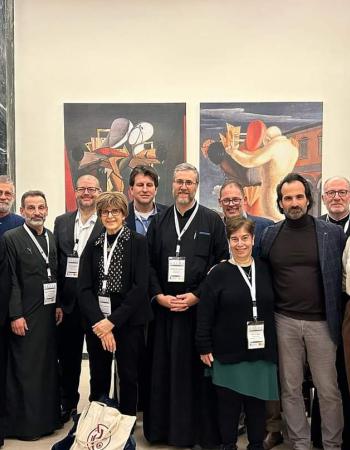
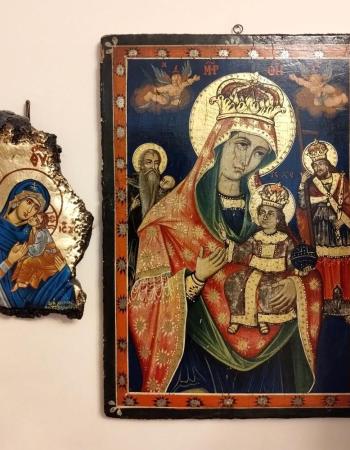
As always, we asked our Woman of the Week, Helen Creticos Theodoropoulos, to tell you about her morning routine. She is also sharing some of her icons with you:.
“Now that my children are all out of the house, I am able to have a little quiet time in the morning to do what I always wanted to do, but never had the time for, which is to simply set aside some time for prayer after I wake up. I love spending time before the icons, all of which have special meaning to me. Just standing before them brings me to a place of peace. My prayer lasts however long or short, as the day requires. If I'm in a space where I can pray outdoors, I like to step outside for that. God’s creation sings of His presence, and is itself a living icon. Two of our daughters live in Albuquerque, New Mexico, and when we travel there, I step out of the back door, where I can see the mountains. Lifting up my eyes to the mountains, I feel my heart lift up, and prayer just flows. Otherwise, I will light the candles and say the prayers of the day, take the time to prepare for the day, and remember all the people who are in need along with our loved ones.
I pray the morning doxology, which is so full of joy and hope, thanksgiving and light. The prayer of Saint Philaret (of Moscow) helps in preparing me for my day. One of my favorite prayers is longer, but I like to pray it in its entirety. It’s called The Breastplate of St. Patrick. I've been diagnosed with breast cancer twice, about 11 years apart. Both times I had chemo and surgery. I started to pray The Breastplate of Saint Patrick the first time I had chemo because it's a prayer of protection. It’s also a prayer of empowerment, a word that we often use in negative ways. But if we think about it in a Christian way, we see it means to open the pathway for the power of the Holy Spirit to be present in us and give us that protection and confidence that we experience when enveloped by His presence. The prayer speaks to the presence of Christ, being completely around you, above you, beside you, in the eyes of those who see you, and more. It’s a prayer of being put into the center of the life of God as a place of refuge and healing, and going forth from there to your day. I found that to be of great strength for me in my treatment. So when I have a little extra time in the morning, I find that to be a great addition to the day.``
Thank you, Helen!
